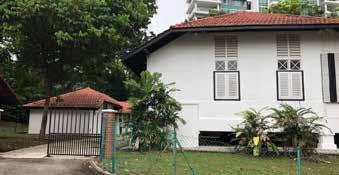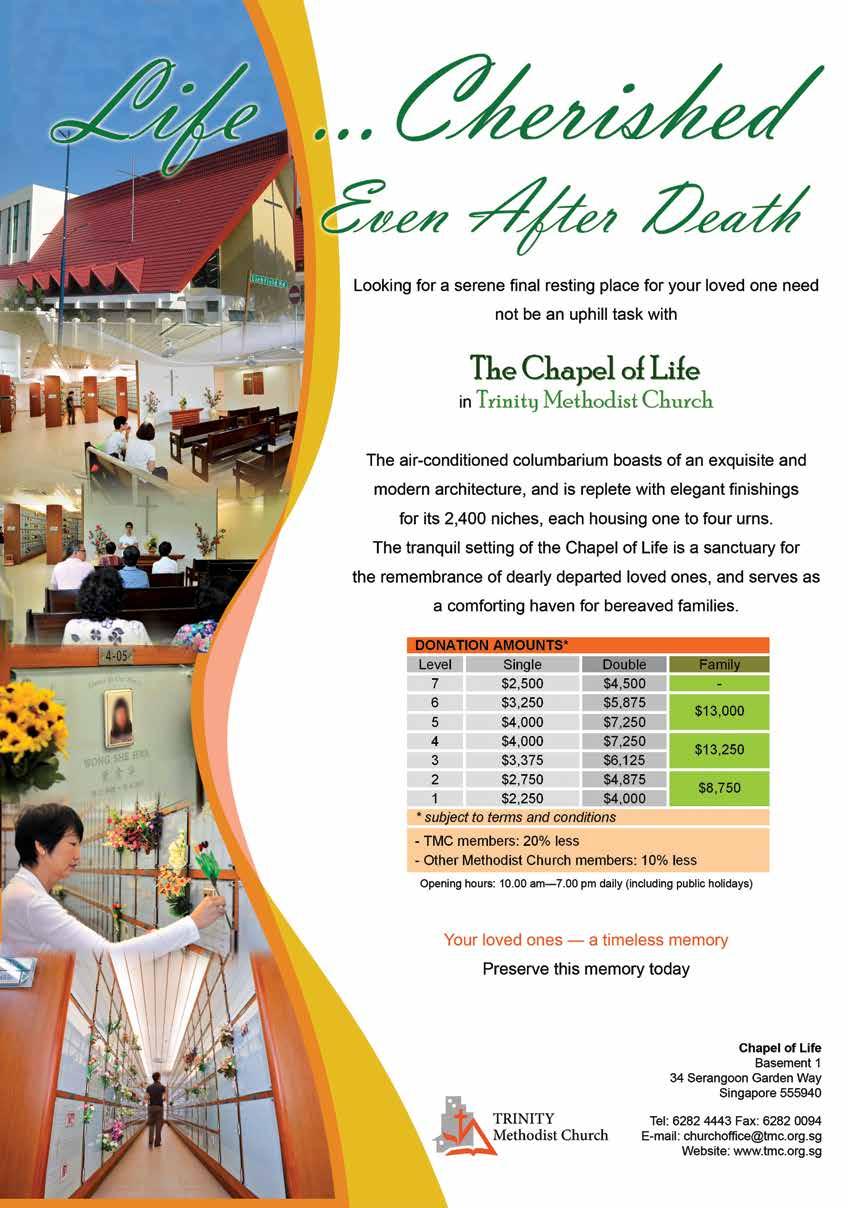
8 minute read
Home—From shame to sanctuary
From shame to sanctuary
If it were up to Jennifer Heng, 44, no woman in Singapore would need an abortion. That is why she set up Safe Place, a shelter for expectant mothers in distress. Safe Place is housed in a Singapore Land Authority black-andwhite bungalow.
In 2017, there were 7,217 abortions recorded in Singapore. This is a staggeringly high number, considering Singapore’s low fertility rate, and that there were 39,615 live births that year. (That number, however, is still much lower than in 1985, during which almost 24,000 abortions were performed.)
Every year, many women resort to abortions because of lack of choice, such as transient living arrangements, or crowded homes that cannot accommodate a new baby. They may come from broken families, or are escaping abusive situations, or became pregnant out of wedlock or because of rape, or may have been kicked out by their families. Some may received a poor prognosis of pregnancy, or are estranged from their husbands.
Each of these pregnant women has a unique and complicated situation that drives her to seek abortion. Jennifer, her team of six staff and about a hundred volunteers work with family service centres, hospitals and VWOs to find solutions for these mothers so that they can keep their babies, and acquire skills to enable them to make a life together with their child.
I want; I can; I hope
As Jennifer explains, Safe Place wants to enable expectant mothers in distress to be able to say:
“I want”—that they resolve to take ownership of their lives and their decisions. This is difficult because many of them come from unhealthy relationships and broken families, and their reflex action is to take flight.
“I can”—to learn practical skills such as caring for their babies, and also softer skills such as communication, understanding their strengths, getting and keeping a job, and maintaining relationships with partners and family members.
And “I hope”—that they will develop, over time, a positive perspective of their future, not just for themselves, but also for their families. “It is possible for [a distressed pregnant woman] not to remain in this situation repeatedly, in a vicious circle,” Jennifer explains.
Walking out of secret shame
Jennifer herself has been through some rocky times. In her book, Walking Out of Secret Shame, she recounts her father’s struggles with bankruptcy and suicidal tendencies, and her family’s breakup when her parents divorced. She went looking for love in romantic relationships in her teens, and ended up pregnant at 17.
Even though she was in a good junior college and was attending a church, she did not talk to anyone in her church or family because not only was she too proud and too ashamed to seek help, she also thought they would not understand. At 22 weeks pregnant, alone and wracked with guilt, she secretly underwent a painful abortion. She and her then-boyfriend never discussed the abortion; they broke up soon after and she started serial dating.
When she was 19 and a polytechnic student, Jennifer started a relationship that turned abusive. She got pregnant again and had a second abortion.
“The effect [of the trauma of abortion] on your entire being is much deeper and much more destructive than you can imagine,” she recounts in her book. “[It] never allows you to go back to normalcy.” The secret shame, guilt and emotional trauma of her abortions and tumultuous relationships did not leave her, even after she went overseas for her tertiary education.
Freedom in forgiveness
For years after that, troubled by her heavy emotional and spiritual burden, she wondered what it meant to be forgiven and to walk with God with a past like that. Surely there were others who had been through the same experience, and were suffering as well— what hope did they have?
In 2001, she attended Discipleship Training School (DTS), run by Youth with a Mission (YWAM). She came to the divine realisation that the only way to be freed from her past would be to be forgiven by God for the abortions, to forgive herself, and to forgive those who had wronged her, such as her exboyfriends and her father.
Later that year, she started working as a pastoral staff at Church of Our Saviour. Around Christmas in 2001, God unexpectedly planted in her mind the thought to start a home for unwed mothers.
A surprising call to serve
Taken aback, Jennifer was greatly unwilling. She tried to push the thought away, but it only got stronger. Two weeks later, a strange thing happened. At church, she met someone whom she had never met before—and whom she was subsequently never able to track down—a man named Adi. Shortly after, Adi sent her an email titled “Stop abortion: a prayer from heaven”. It was a poem written, from the perspective of an aborted baby, to her mother, which directly echoed God’s call to start a home.
As Jennifer talked more to a counsellor and several trusted friends, she felt that spiritual call more urgently.
In 2010, a divine appointment led her to the offices of Armour Publishing. She was by then married with a daughter. When her book was published In 2012, it raised public awareness not just to her personal experiences, but also to the
taboo subject of abortion and pregnancy out of wedlock. Her story was covered by the media, and the book’s first print run of 1,000 copies was sold out even before its official launch.
A culture of life
Jennifer says, “As a Church, we should not just be known for what we are are against, but what we are for. We need to be solution providers.” That is why, for her and her team at Safe Place, it is not just about being against abortion, but also about supporting life and providing expectant mothers in distress with tangible solutions.
The same year her book was published, Jennifer started the Life Network, an informal group of individuals and organisations with a similar ethos— people involved in the adoption and fostering of children, and caring for pregnant women. They began to meet and pray about what they could do to build a culture of life in Singapore.
In 2014, Jennifer, in partnership with HCSA Community Services, started Dayspring New Life Centre to empower unsupported women to make lifegiving choices. She was surprised at the amount of media coverage, ground support and societal awareness that the centre evoked. By 2016, they had helped 39 women through their unsupported pregnancies. In many cases, the centre mediated so that women estranged from their parents and families because of their unplanned pregnancies were reunited.
“Whenever we looked at these children we had saved—these people who might not have existed if not for our work—if all we had done was to save just one of these children, all the time and effort we spent would have been worth it,” says Jennifer.
Providing a safe place
In 2017, after Dayspring New Life Centre closed, Jennifer was connected with Lakeside Family Services, which runs family services (case work and counselling, financial assistance, information and referral services for families in need) as well as centres for children, youth and seniors. Safe Place is fully privately self-funded, with Lakeside providing corporate services support and governance.
It provides case management and counselling for its clients, by teaching them parenting and life skills, and helping them to make and effect concrete plans for the future. Safe Place also provides temporary accommodation for up to eight women in their centre—from the time they seek help until their babies are four months old. All services are provided free.
At any one time, Safe Places handles about 40 cases. It has served more than 110 women since its inception.
Abortion: also a Christian problem
Jennifer tells of a pastor of a large church who called her because a church member had become pregnant out of wedlock. This member had been kicked out of her home, and the pastor asked Jennifer if she could take her in.
Jennifer asked the pastor why no one in her church of several thousand members could put her up. Sadly, no one was willing or able to. “What if this woman is ostracised? What if people look at her differently?” was the pastor’s reply. But pregnant mothers in distress are just one of so many groups of vulnerable people: ex-offenders, sex workers, drug addicts, rebellious teenagers.
“Don’t you think,” Jennifer asks, “that the church community should be the best place to provide such help? A loving and supportive community is the solution to lowering the number of abortions. A life-giving culture, which doesn’t just say ‘don’t abort’, which isn’t so quick to condemn, but which promotes family, love and sacrifice, and everything that the Christian faith espouses.”
Jennifer’s hope is that there will no longer be need for homes like Safe Place. To eliminate the need for abortion, the solution is not found in an organisation like hers—it is found in the community and the Church. Everywhere, she says, should be a safe place.
SAFE PLACE
https://safeplace.org.sg/
safeplace@lakeside.org.sg
6817-4202 (office) 8891-4214 (WhatsApp)
HOW YOU CAN HELP
Give money: Safe Place is fully privately self-funded
Sponsor a gift: contact Safe Place to see what they currently need
Volunteer: to help the new mothers with their babies, provide respite care, office admin work, ad hoc cleaning, packing of donations, fund-raising. Couples are encouraged to help together, to provide the mothers with a strong model of marriage and family that they might not have seen close-up before.
Pray: for God’s protection over Safe Place, and for the mothers and babies it serves
Walking Out of Secret Shame
by Jennifer Heng Published by Armour Publishing (2012), 112 pages
ORDER AT
http://www.armourpublishing.com $14.98 (paperback, in English & Chinese). Enjoy 20 per cent off the price of Walking Out of Secret Shame by using the promo code WOOS042020MM at the webstore’s checkout page (valid from 1–31 May 2020).











